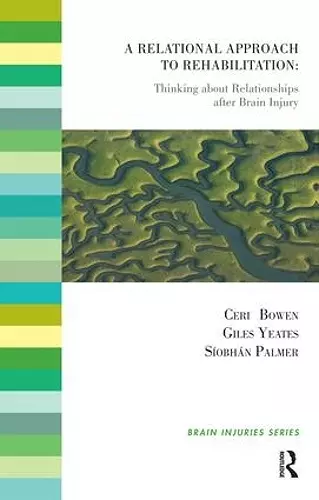A Relational Approach to Rehabilitation
Thinking about Relationships after Brain Injury
Giles Yeates author Ceri Bowen author Siobhan Palmer author
Format:Paperback
Publisher:Taylor & Francis Ltd
Published:31st Dec '10
Currently unavailable, and unfortunately no date known when it will be back
This paperback is available in another edition too:
- Hardback£125.00(9780367106621)

This book is one of very few books on the topic of family adaptation and relationships after brain injury. It is an important topic because of the unique impact that such a trauma can have on families. Whether professionals are working in the community doing home visits, or working in rehabilitation and care settings where family members visit, the issues are important not just to help family members cope in adverse conditions but also to improve outcomes for the people with brain-injuries.This book will be of value to all health and social care practitioners working in the field of brain injury and chronic illness (e.g. physicians, clinical psychologists, neuro-psychologists, social workers, speech therapists, occupational therapists, physiotherapists, dieticians, nurses).
Subjects Covered: Family therapy, Neurology, Neuropsychology, Neuro-rehabilitation, Neuroscience, Psychology, Nursing, Sociology, Anthropology, Couple relations, Family studies.'This book is a welcome addition to the brain injury literature. It is timely, thoughtful, comprehensive and important. The tide has been turning in neuro-rehabilitation, with growing awareness that brain injuries do not simply happen to individuals but also their families and the broader community. Each person's ability to function effectively is defined within this context. The authors tackle the complexities of brain impairment from neuropathology through to rehabilitation from a contextual framework. Their focus on interventions embraces a spectrum of systemic approaches with clear relevance to acquired brain injury. This book is a wonderful resource for clinicians and researchers interested in holistic rehabilitation.'- Skye McDonald, Professor, University of New South Wales, Australia'Brain injury is a sudden, unexpected and highly devastating event - not only for the individual with the injury - but also for his/her relations, be it on a couple, family or community level. This inevitably requires these individuals to make (often major) adjustments. Undeniably thus, brain injury professionals must not only 'intervene' on an individual level, but also on a relational level. Adding a relational element to neuro-rehabilitation makes of course perfect sense - our identities, functions, roles, and so on, are continuously being defined by our social interactions. In their book Bowen, Yeates and Palmer convincingly provide the framework for such a "relational neuropsychology" or "relational neuro-rehabiliation" approach. This is followed by chapters devoted to specific interventions, where numerous case examples are provided in a clear, detailed and highly instructive manner. The book concludes with a critique of existing research and provides suggestions for future research. The book is well-written and accessible, yet scholarly. The authors are able to present ideas and models from a wide variety of intellectual traditions - including systemic family therapy, second-order cybernetics, communication theory and social constructivism. It is about time that such a book is available. If brain injury professionals read this book, which I urgently encourage they do, it will undoubtedly change the way they think and work. As a consequence, the book is also likely to alter the nature of the domain of neurorehabilitation.'- Frank Laroi, University of Liege, Belgium'This book breaks new ground, providing the most sustained exploration of how family systems theories (ranging from psychoanalytic perspectives to post-modernist Milan) can be synthesised with neuro-behavioural and neuropsychological approaches to produce a relational approach to neuro-rehabilitation. The authors draw upon a rich array of empirical research, theoretical frameworks and clinical experience to outline their approach, interweaved with case illustrations, practice models and therapeutic strategies. The book will be an invaluable resource to psychologists, social workers, family therapists and all other professionals who have an interest in relational approaches to neuro-rehabilitation.'- Grahame Simpson PhD, Research Team Leader/Social Worker-Clinical Specialist, Brain Injury Rehabilitation Unit, Liverpool Hospital, Sydney, Australia'This is a profound bridge-building book. It crosses bridges and connects together professionals with diverse training and vastly different skill sets; family members picking up their lives following the crisis of brain trauma; and traditionally competing psychotherapeutic models and theoretical frameworks. Neuro-rehabilitation clinicians and other health and welfare service providers will know when they read this book that the complexity of their task in assisting families dealing with acquired brain injury has been deeply understood. In an eclectic and integrative guide replete with clinical wisdoms in working with individuals, couples, families and communities there is much to engage those starting clinical careers and those in the prime of their working lives - relationships do matter!'- Dr Amaryll Perlesz, Associate Professor, The Bouverie Centre, La Trobe University, Australia
ISBN: 9781855757486
Dimensions: unknown
Weight: unknown
392 pages